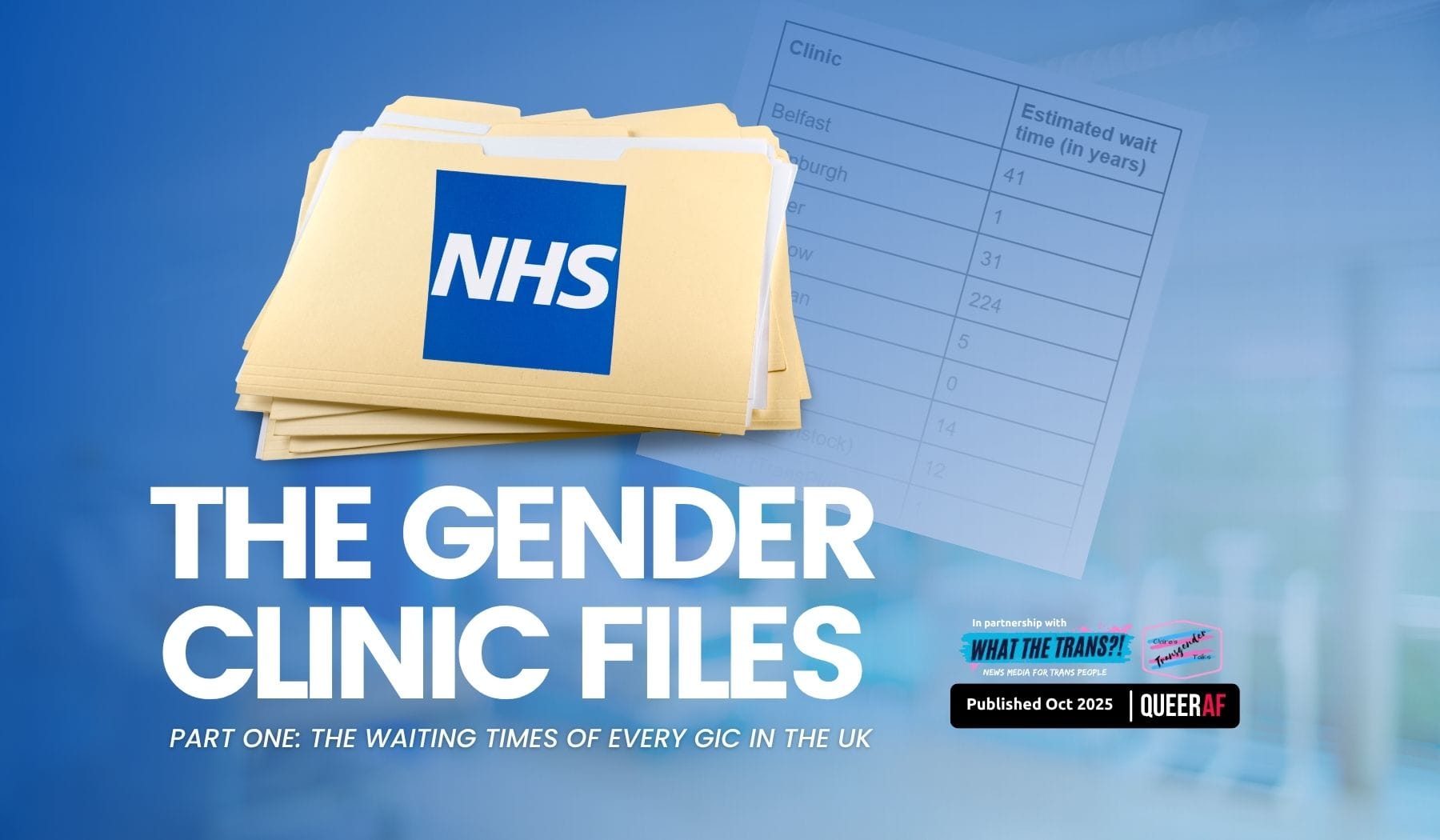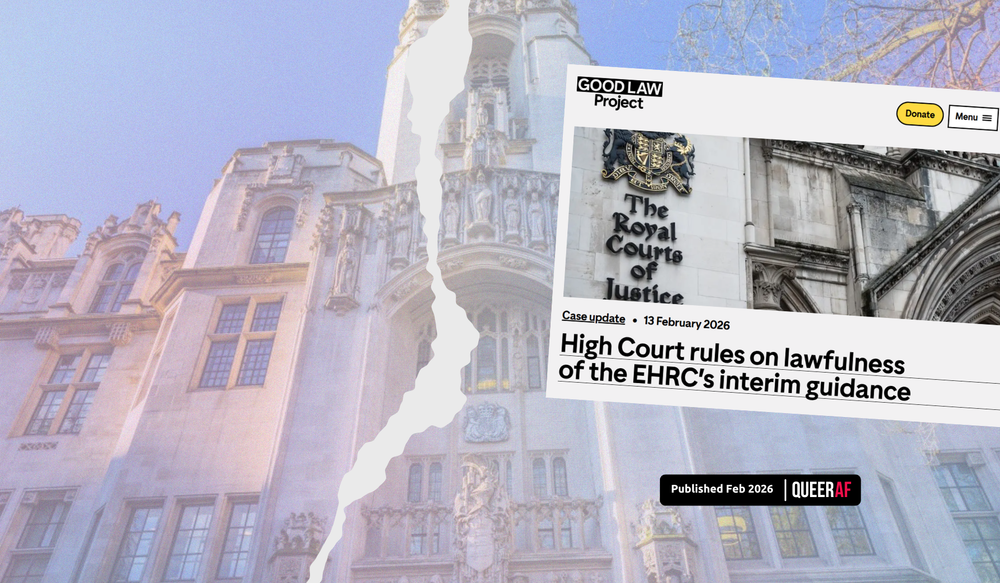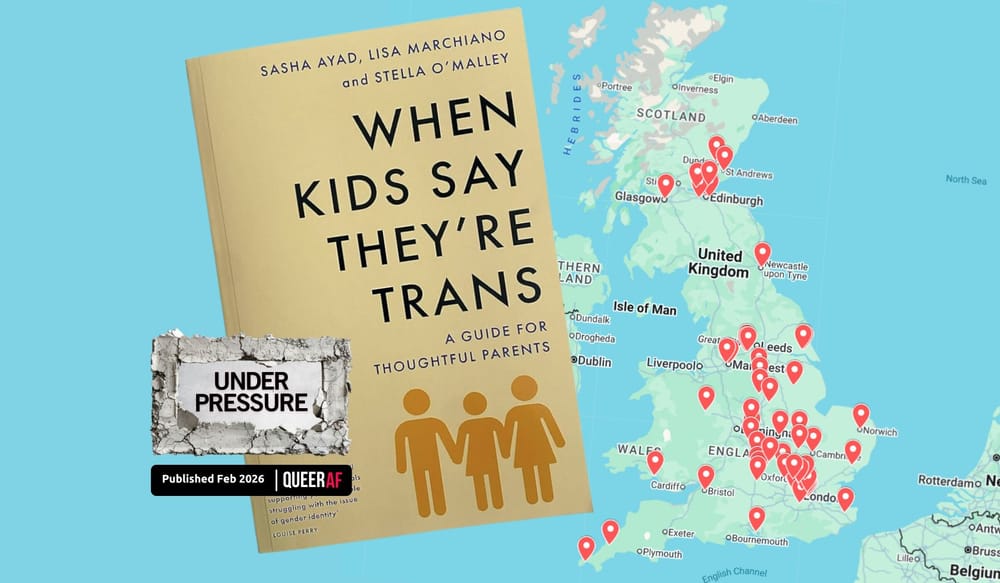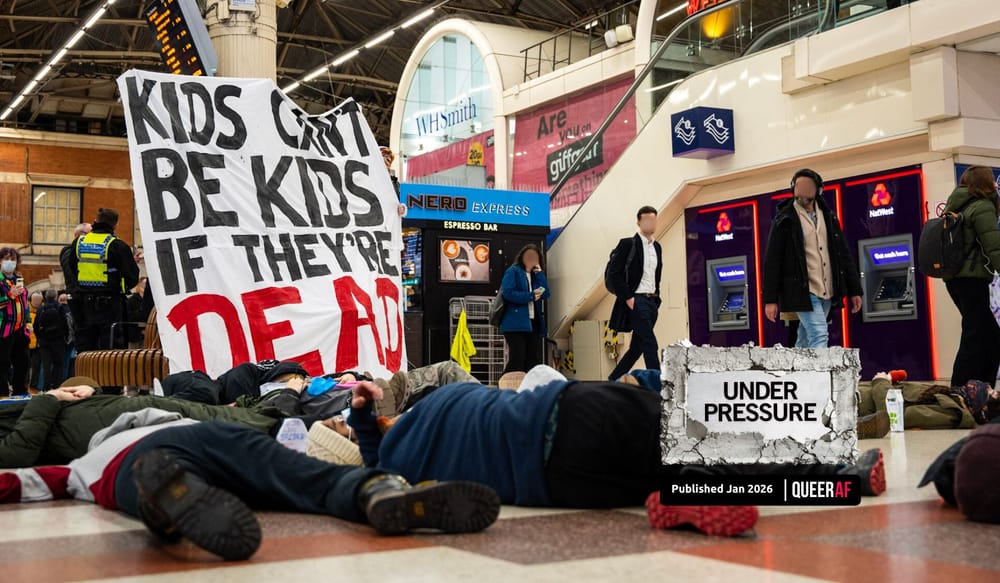
TL;DR: Most Trans+ people in the UK will wait more than a third of their adult life to get their first appointment at an NHS gender clinic, and some will never receive care, QueerAF can reveal. This is the start of a new series in the QueerAF newsletter that exposes deep structural issues with the UK’s approach to transgender healthcare.
More than 48,000 people in the UK were waiting for their first NHS gender clinic appointment as of March 2025, a 12.5% increase since the previous year, according to new data obtained through Freedom of Information (FOI) requests and seen exclusively by QueerAF and What The Trans!?
Amid this growth in the waiting lists for Trans+ healthcare, the 15 gender clinics operating across the UK are totally failing to meet the demand for their services.
In fact, for every person who had an initial assessment at a gender clinic in the UK last year, four more people were added to a gender clinic waiting list. At one clinic in Scotland, the data we’ve seen reveals a waiting time that's almost three times longer than the average British life expectancy.
We can reveal our analysis of the most up-to-date picture just weeks after the health secretary made a speech about what he called the “unacceptable” wait time. In a speech to the NHS England LGBT+ Health Annual Conference, Wes Streeting said the average wait in some regions was now eight years. This claim is based on old data from 2023 to 2024.
In our analysis, which uses figures from March 2024 to March 2025 painstakingly put together through a series of FOIs, we can show the average estimated waiting time to access an initial appointment at a gender clinic is now 25 years across the UK. Examining different regions sees this change dramatically, with worse results in both Scotland and Northern Ireland – where some people will wait as long as six decades to get help.
The data shows that to meet referral demand over the last year alone, 10,000 more initial assessments would have been needed to be made.
Claire Prosho, founder of Claire’s Trans Talks and formerly of trans-led human rights organisation TransLucent, who filed 30 FOIs to understand the true picture of healthcare across the UK, said:
“It is disappointing but unsurprising to see that little progress has been made by the NHS nor UK Government in improving access to, or the performance of, life saving adult gender services across the UK, which still languish behind the levels of service documented in 2019 despite increases in staffing, budget and new clinics.”
She added: “It is beyond time for the current failed 'diagnostic' service models to be replaced by a simple informed consent model, in line with international best practice and consultation with the trans community.”
Professor James Palmer, NHS national medical director for specialised services, said: “We know there are unacceptably long waits for many of these services.
“This is why we have commissioned an independently led review into the operation and delivery of the adult gender dysphoria clinics, alongside work we have already undertaken to introduce new care models that are making significant progress in helping to bring down these very long waits.”
Trans+ health in the UK is a postcode lottery
The national picture shows waiting times that far exceed the NHS's recommended maximum of 18 weeks. But drilling down into the data reveals huge disparities across the UK.
In England, the average waiting time for a first appointment stands at 12 years. In Wales, it’s two years. People in Scotland face a lifetime of waiting, with an average wait time of 58 years. In contrast, Northern Ireland has seen a significant ‘improvement’ in waiting times: Trans+ people will now face an average wait time of 41 years, down from 151 years the last time this data was collected.
A few things seem to be driving the differences in average waiting times between UK nations.
In Wales, which has the shortest waiting time, it has actually increased slightly since last year – the data suggests this is due to a slight decrease in staffing levels.
In Scotland, average waiting times have increased to 58 years, and this appears to have been driven not only by a reduction in staffing but because of a complete collapse in the number of initial assessments being delivered at the Glasgow service, where the average waiting time for an initial assessment now sits at an astonishing 224 years.
A number of pilot services have been rolled out by the NHS in the last five years, all based in England. Some of those are now operating as full services: TransPlus in London, Indigo in Manchester, and the East of England Service, which is a satellite of Nottingham’s gender clinic.
These pilot clinics are performing better than traditional gender clinics, reducing the average waiting time for a first appointment across England to 12 years; however, almost all traditional gender clinics in England still have a waiting time exceeding 10 years, with some individual clinics having wait times that span multiple decades.
The waiting times for every adult GIC gender clinic in the UK
Across the 15 operating gender clinics in the UK, waiting times for a first appointment are getting longer.
Based on the data available to us, we've estimated how long it will take to get a first appointment if capacity and demand remains the same.
They vary hugely: from a three-year wait in Nottingham (including the waiting time at the new pilot East of England gender clinic) to a 224-year wait in Glasgow. The three worst clinics are Glasgow (224 years), Exeter (31 years) and Belfast (41 years):
| Clinic | Wait (years) |
|---|---|
| Belfast | 41 |
| Edinburgh | 1 |
| Exeter | 31 |
| Glasgow | 224 |
| Grampian | 5 |
| Highlands | 0 |
| Leeds | 14 |
| London (Tavistock) | 12 |
| London (TransPlus) | 1 |
| Manchester (Indigo) | 2 |
| Newcastle | 18 |
| Northants | 17 |
| Nottingham** | 3 |
| Sheffield | 10 |
| Welsh Gender Service | 2 |
Estimated wait time for a first appointment as of March 2025 (in years) based on QueerAF analysis of data from FOIs. **Nottingham includes pilot clinic at East of England.
The enduring impact of this wait for healthcare
When Juliet was first referred seven years ago, she was told by the gender clinic that it would be a 20 month wait for her first assessment.
“I knew that was a lie at the time,” Juliet says. “I expected it to be two to three years. If I’d known at the time it would be seven years without an appointment I would have gone to a different gender clinic. But going to a gender clinic with a shorter wait list just pushes the problem around – it doesn’t solve the problem.”
Once she realised how long she’d be waiting for NHS healthcare, Juliet went to a private provider to start hormone therapy.
“The level of cost is prohibitive. To afford it, I’ve had to move back in with my parents – rents in Cornwall are astronomically high and pay rates are low. I see other people saving up to buy houses, moving on with their lives and going on holidays, which is not an option for me because of this burden I have to deal with.”
Juliet says being on the Laurels waiting list has definitely had a negative impact on her mental health, though she says she’s fortunate to have a good group of friends and family who are very supportive of her. “When you see the aggression the trans community is receiving at the moment it’s another burden on top of it,” she says. “It’s a real struggle.”
But there are glimmers of hope. The new services in London and Manchester are keeping on top of their waiting lists in a manner that traditional gender clinics have yet to manage.
TransPlus, at London’s central LGBTQIA+ sexual health service in Soho, 56 Dean Street, still has a waiting time of one year for a first appointment, five years after it opened in 2020. And Indigo in Manchester – the only trans-led gender service in the UK – has a two year waiting time for a first appointment.
The data, which QueerAF will examine closely in another The Gender Clinic Files article released in a later newsletter, shows that these services are outperforming traditional gender clinics on almost every measure – more on this soon.
Analysis: A simple fix, under a different political paradigm
This new data confirms what we already knew: there is a trans+ healthcare crisis in the UK. But the actual numbers are stark. The system of NHS gender clinics, which is failing to give people an appointment in their entire lifetime, is limiting the number of people who can transition.
This system is failing to support people to transition not because it is broken, but by design. The frustrating thing is that this would not be a difficult problem to solve under a different political paradigm.
Trans+ people do not need to be assessed by gender clinics or diagnosed by psychiatrists to tell us what we already know: we are trans. The healthcare we need, especially when it comes to hormones, is already available to cis people through making an appointment with their GP.
Gender clinics are unnecessary and exist to segregate healthcare for Trans+ people. Abolishing this system and providing Trans+ healthcare in primary care, at the GP through an informed consent model, would solve many of the issues this data reveals. GPs already prescribe hormones to cis adults. Trans+ adults simply need the same access to this healthcare.
*Some names have been changed to protect the privacy and safety of trans individuals discussing their personal healthcare.

This investigative series that is being published first in our newsletter and runs every Saturday October 2025 quickly became highly anticipated.
"Important journalism dropping this weekend from @wearequeeraf.com. If you can afford to, taking out a subscription will help the amazing team tell more of their brilliant in-depth stories, the ones that mainstream media won’t touch." - Alice Litman's mother, author of Her Name Is Alice, Caroline Litman
We hope that as we release it today it will become a useful tool for everyone to advocate for the healthcare they deserve.
"Support QueerAF’s important investigative work. This work costs, and we need even more of it." - Founder of Trans+ History Week, Marty Davies
Information is a tool for liberation, and we need your help to deliver our investigations - free from ads, or outside pressures.
"Trans people deserve an outlet that doesn't qualify or negotiate their existence - and QueerAF celebrates trans lives, without condition." - Founder of Good Law Project, Jolyon Maugham
It likely goes without saying all of this journalism and investment in talent costs a great deal. Luckily, as the UK's only press-regulated and not-for-profit LGBTQIA+ publisher, we're well-placed to ensure every penny is put towards our long-term mission to change the media. So please, if you found this article valuable:











